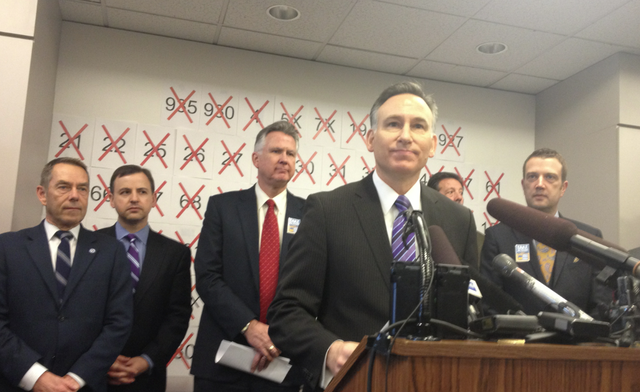Seattle leaders now have the money to drop regressive tax increases
Last week, the King County Council voted to preserve 95% of Metro bus service without raising taxes. The council’s action will likely comfort those who stood to lose most from tax increases and threatened bus cuts: the public, bus riders, and especially, low-income families and the disabled. Earlier this year King County officials threatened to cut 17% of bus service if voters did not raise regressive tax increases on the April ballot.

Earlier this year, King County officials threatened bus cuts if voters did not approve raising regressive taxes. In the background, numbers with red X’s illustrate the neighborhood bus routes leaders planned to cut.
Councilmember Larry Phillips said, “It’s either bus cuts or this [regressive tax increases],” adding it’s, “One or the other” and “Transit cuts will happen.” Supporters of raising taxes said the region would be crippled with gridlock and leave people helpless. Ken Michelson of the Alliance for People with Disabilities said, “People could literally die without transit to access food, and go to needed doctor appointments.” Activist Renee Stanton said, “My son’s bus to school will now be going away.” Metro Transit Director Kevin Desmond said he planned to cut “the meat and muscle” of service. County Executive Dow Constantine said people had “lived under the threat of drastic cuts,” for five years.
Our analysis, however, showed Metro was receiving record revenue, a $32 million windfall above previous estimates, without raising taxes. Not only that, Metro is receiving more tax money this year than at any point in its history, approaching a half a billion dollars in sales tax revenue. In the face of the good news, however, county leaders still pushed for regressive tax increases.
Yet, despite the sky-is-falling threats and the pro-tax campaign outspending the anti campaign 55 to 1, the public rejected last April’s false choice with nearly 54% of the vote.
Soon after the election, Washington Policy Center wrote in The Seattle Times that Metro officials could better manage their rising revenues and work with union officials to keep bus service on the road. We recommended county managers scour Metro’s $338 million capital budget since government officials were spending more than they planned to buy new buses.
After months of debate, county leaders acted on those recommendations. County officials and union executives agreed on a new labor contract that provided pay raises and kept bus service on the road. The generous contract was rejected by union members, and the dispute is now in arbitration. A favorable ruling would free up more money for community bus service.
Metro officials also lowered their capital account spending, as we recommended. According to Metro, the agency will save $90 million by purchasing fewer buses and negotiating lower bus prices. In addition, windfall sales tax revenues clearly gave Metro leaders the incentive to reduce or eliminate their threatened cuts to bus service.
Even though Executive Constantine and council members have dropped the false choices they provided voters in April, Seattle officials still plan to raise regressive car fees by $60 and to increase the sales tax to supposedly preserve bus services that are not being be cut. Seattle City Council members could (per the council meeting available here – 72:00 minute mark) lower the tax burden they place on the public. Seattle Tax District Chair Tom Rasmussen said, “If we need less, we could collect less,” as the tax increases approved in Seattle are designed to “Simply stop the bleeding.” Like their County counterparts, Seattle leaders now have the money to preserve bus service without raising regressive taxes.


